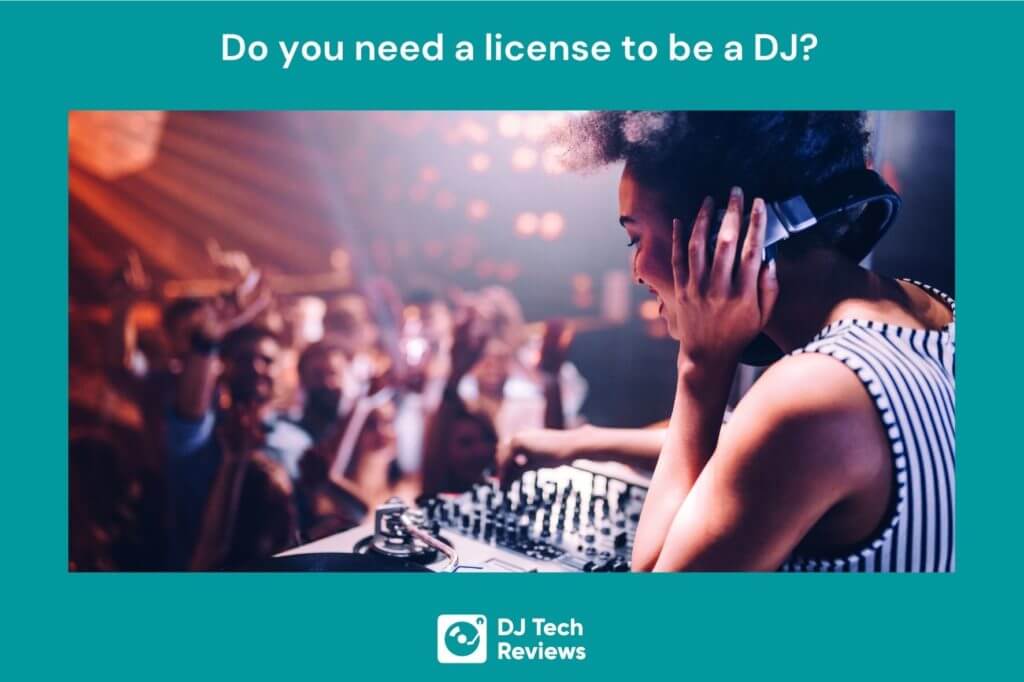A DJ license? Is there even such a thing? There are a lot of things you need to know and be aware of if you want to become a successful DJ. You need to make sure you have an adequate DJ controller device with a good type of DJ software. Similarly, you need to be well aware of the different terms and techniques when it comes to performing – either on stage or at your home studio. However, one of the most important aspects of being a DJ comes down to your ability to understand the different facets of the legal copyright system, ensuring that your career doesn’t end before it even has a chance to truly begin.
For many starting DJs in the field, one of the biggest questions they have is whether or not a DJ needs the musical license of a song if they want to play it. Essentially, “Do DJs need to have legal permission before they can play a song?”
Interestingly enough, while music licenses are often a requirement for any commercial use of a person’s song, that doesn’t seem to be the case when it comes to DJs in most cases. Legally, a DJ doesn’t need to get any formal permission to play a song, be it at an open space, like a restaurant, bar, or club; or while performing a gig at a private event, like a wedding or a birthday party.
Still, while this is generally the rule for most people, there are a few exceptions that we’ll need to discuss. Here, we’ll go over the different reasons a person may need some sort of legal permission if they want to host a DJ gig playing otherwise copyrighted songs.

What Are The PROs?
Before we can go over some of the different examples of where you’d need permission, it’s important to talk about the PROs. Also known as the Performance Rights Organizations (PROs), the PROs are several different legal bodies that work to legally represent artists. These individuals ensure that, regardless of the public space, an artist is given adequate royalties for their written or composed works.
- Public Space: A “public space” is considered any outside area that is free for the public to gather. This can range from a bar, club, restaurant, store, or even an outdoor area like the park or an open field.
- Private Event Space: A “private event space” is an area that, conversely, is not open to the general public. These areas often include birthday parties, wedding receptions, or even some normally public spaces that have been privately rented out. These areas do not need to be covered by a PRO, as the event is private.
PROs collect a subscription fee from their members. In return, those members are allowed a legal license to play songs from their respective databases. What makes this such an interesting aspect is that, if an artist is represented by a PRO body, all of their respective songs will be included as potential song options in their database.
What PRO Bodies Exist In The US?
In the United States, there are currently 3 major Performance Rights Organization bodies that exist. These include:
- American Society of Composers, Authors, and Publishers (ASCAP)
- Society of European Stage Authors and Composers (SESAC)
- Broadcast Music, Inc. (BMI)
Where the ASCAP and the BMI organization bodies are considered non-profit, the SESAC does collect some income as profit.
Between the above three organizations, virtually all American artists are licensed and covered.

Should A Venue Have Licenses From All 3 PRO Bodies?
It may seem strange to need to get licenses from all three PRO bodies, but, ideally, if you want the largest number of options, your venue should have licenses from SESAC, BMI, and ASCAP. This is because, as mentioned earlier, each organizational body covers its respective artists.
For example, if you wanted to include a song from Adele’s new album, you’d have to consider, not just Adele’s herself, but the various artists, lyricists, composers, and features as well. All of these individuals are represented by their own respective PRO body – either collectively with one PRO, or spread out across all three.
As such, if you played any song from her album, any or all three PROs could claim royalties from a venue. With the many different artists and songs that are being affected or played, you can only imagine just how complex and potentially expensive even a single 30-minute playlist could be for a venue.
By having a license from all three groups, a venue can avoid this costly headache, instead of focusing more on ensuring the event goes as smoothly as possible without any unexpected legal bills coming in the mail.
What If The Venue Hasn’t Paid Royalties To The PROs?
A venue that hasn’t paid royalties out, or hasn’t licensed the music with the PROs, is a very tricky situation for a performer. You’ll want to find out as soon as possible how compliant they are with these rules and if you are covered.
If you are at a venue that does not have a license from one or all of the PRO bodies, you have essentially one of two options: Have your licenses already or don’t perform at that venue.
Overall, because both royalty payouts or licensing fees can be incredibly costly, especially if you’re just starting (you can spend upwards of $5,000 to be licensed with all three PROs) it may be better to just not perform at the venue and find another place.
Increased Regulation Enforcement
Until relatively recently, most PRO authorities didn’t pursue smaller restaurants, bars, or cafes. With the onset of digital pirating and people freely putting out unlicensed music at open events, enforcement has increased and become much more strict. As such, it’s more important to be covered now than it ever has been before.
Am I Able To Perform While Abroad?
If you’re thinking you’ll be able to perform songs without a license while in a different country, you’re mistaken. While you may not be subject to the same PRO enforcement as you would be in your home country, each country has its own PRO body group, with each having its respective level of enforcement. Your best bet is to find out if your particular venue will be compliant with their respective copyright laws to avoid any potential legal or financial challenges.

DJ License: Summary
Understanding what is accessible and what isn’t can save you a lot of money, both in the short term as well as over the long haul. Knowing what places require PRO license coverage and what places won’t, as well as what places do and don’t offer coverage, is incredibly important. By being aware of your legal options, you work to ensure that you are never put in a bad light or forced to pay some exorbitant fee.
If you need to learn more, be sure to speak with a copyright expert or copyright attorney to know what is best for your particular situation.
Related Articles
- 12 Legal Websites to Download DJ Music for Free: Unleash The Ultimate Playlist
- 300 Most Requested DJ Songs: Creating The Most In-Demand Playlists
- How Does The Music Industry Work? (Everything You Need to Know About the Music Industry)
- Can I DJ On Facebook? (Facebook Music Streaming and Live Rules EXPLAINED)
- How Long Should A DJ Play A Song For? (Is This A Trick Question?)




